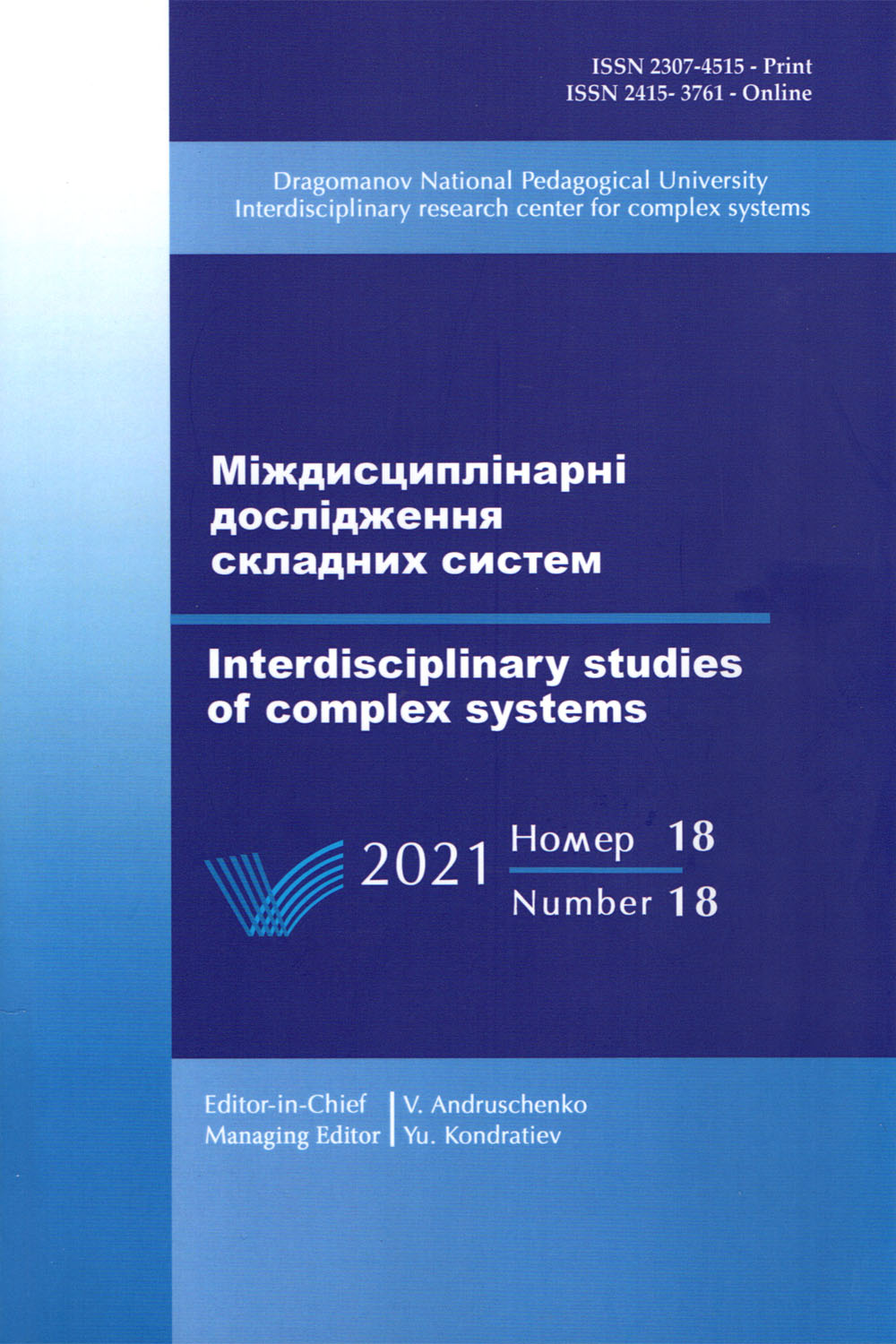Science in the modern world: from value to complexity
DOI:
https://doi.org/10.31392/iscs.2021.18.053Анотація
The paper focuses on the problem of actualizing the role of
science as a complex system in the prospects of development of society
and man. The development of science is shown to have led to the formation and assertion of information and digital reality. It has accelerated
the pace of globalization in all spheres of life— from obtaining information
to knowledge, from the expansion of visual communication to stimulating
the movement of people, technology and finance. At the same time, the
introduction of scientific innovations deepens the polarization of countries,
continents and regions in terms of technological potential. The growing
complexity of the modern world can be realized by appropriate complex
thinking. The paper has revealed the main stages of formation of a new
type of personality capable of understanding the complex world, independent decision-making, in the process of cognition and freedom of behavior
in a situation of radical transformation of values of science and culture.
The dynamics of changes in science, technology, socio-cultural and economic life is determined as well. This situation gives rise to a new “reflective society”, corresponding to the initial levels of information theory
of complexity, in the context of which human activity becomes non-linear,
innovative and chaotic. It is emphasized that understanding the dynamics of a complex world and its systems stimulates the emergence of new
approaches in management theory. In their context, the task of forming
complex thinking is set, the ways of its active introduction into the culture
of scientific knowledge and learning are determined.
Посилання
Wallerstein I., 2004. World-System Analysis : an introduction. Durham:
Duke University Press.
Horbunova L. S. 2011. Skladnisne myslennya yak vidpovid na vyklyk
epokhy: filosofiya i metodolohiya rozvytku vyshchoyi osvity Ukrayiny v
konteksti yevrointehratsiynykh protsesiv. Kyiv : Pedahohichna dumka.
[Complex thinking as a response to the challenge of the era: philosophy
and methodology of higher education development in Ukraine in the context of European integration processes]. [in Ukrainian]. [3] Kaku M. 2014. The Future of the Mind: The Scientific Quest to Understand, Enhance, and Empower the Mind. New York : Doubleday.
Knyazeva Ye. N. 2010. Kak vozmozhno myshlenie o slozhnom i upravlenie
slozhnost’ju. Voprosy filosofii, no. 10:81–83. [How Complex Thinking And
Managing Complexity Is Possible]. [in Russian].
Mayntser K. 2010. Vyzovy slozhnosti v XXI veke. Mezhdistsiplinarnoye
vvedeniye. Voprosy filosofii. no. 10:84–98. [Challenges of complexity in
the XXI century. Interdisciplinary introduction]. [in Russian].
Mikeshina L. A. 2008. Filosofiya poznaniya. Problemy epistemologii gumanitarnogo znaniya. Moskva : Kanon+ ROOI Reabilitatsiya. [Philosophy of knowledge. Epistemology problems of humanitarian knowledge]. [in Russian].
Morin E. 1992. Method: towards a study of humankind. Vol.1. The
nature of nature. New York, Berlin, Bern, Frankfurt. M., Paris, Wien :
Peter Lang.
Ogurtsov A. P. 2011. Filosofiya nauki: dvadtsatyy vek: Kontseptsii i
problem. V 3-kh chastyakh. Chast vtoraya: Nauka v sotsiokulturnoy
sisteme. Sankt-Peterburg: M´ı. [Philosophy of Science: Twentieth
Century: Concepts and Problems]. [in Russian].
Pinker S. 2019. Prosvitnytstvo sohodni. Arhumenty na koryst rozumu,
nauky i prohresu. Kyiv : Nash format. [Enlightenment today. Arguments
in favor of reason, science and progress]. [in Ukrainian]
Fagot-Largeault A. 2009. The Legend of Philosophy’s Striptease (Trends
in Philosophy of Science). French Studies in the Philosophy of Science :
Contemporary Research in France. Dordrecht : Springer Netherlands:
–49.
Heidegger M. 2013. Being and time. [United States]: Stellar Books.
Khramova V. L. 2011. Kul’turologicheskiye obrazy nauki v postpozitivizme. Sofiya : Kulturolohichnyy zhurnal. no. 11:14–58. [Cultural images of science in post-positivism]. [in Russian].
Carroll S. 2016. Breakthrough: The Saga of Jonas Salk. Trident Press.
Like T. 1996. Identity, Meaning and Civilization: Detraditionalization in
Post-Modern Space-Time Compression. Detraditionalization. Oxford.
Mainzer K. 2007. Thinking in Complexity. The Computational Dynamics
of Matter, Mind, and Mankind. New York : Springer.
##submission.downloads##
Опубліковано
Номер
Розділ
Ліцензія
Автори, які публікуються у цьому журналі, погоджуються з наступними умовами:- Автори залишають за собою право на авторство своєї роботи та передають журналу право першої публікації цієї роботи на умовах ліцензії Creative Commons Attribution License, котра дозволяє іншим особам вільно розповсюджувати опубліковану роботу з обов'язковим посиланням на авторів оригінальної роботи та першу публікацію роботи у цьому журналі.
- Автори мають право укладати самостійні додаткові угоди щодо неексклюзивного розповсюдження роботи у тому вигляді, в якому вона була опублікована цим журналом (наприклад, розміщувати роботу в електронному сховищі установи або публікувати у складі монографії), за умови збереження посилання на першу публікацію роботи у цьому журналі.
- Політика журналу дозволяє і заохочує розміщення авторами в мережі Інтернет (наприклад, у сховищах установ або на особистих веб-сайтах) рукопису роботи, як до подання цього рукопису до редакції, так і під час його редакційного опрацювання, оскільки це сприяє виникненню продуктивної наукової дискусії та позитивно позначається на оперативності та динаміці цитування опублікованої роботи (див. The Effect of Open Access).











